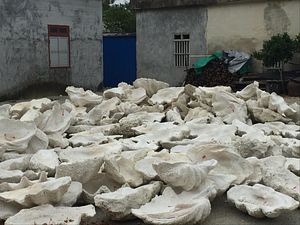To both domestic and international observers, fishermen from Tanmen, a small fishing town in China’s Hainan province, are the country’s “maritime rights protection” vanguard in the South China Sea. For centuries, Tanmen fishermen have been fishing in the area, particularly in waters near the Scarborough and Spratly islands, and in recent years have been directly involved in some of the major conflicts there, including the 2012 Scarborough Shoal standoff and the 2014 Sino-Vietnam 981 oil rig row. Tanmen fishermen have also been delivering supplies and building materials to China’s Spratly outposts and supporting China’s island building in the South China Sea. Hence, in China, it is said that without Tanmen fishermen, there would be no Sansha city, and perhaps even no South China Sea for China.
While it is certainly true that Tanmen fishermen’s growing presence in the South China Sea is encouraged by the Chinese government to a certain extent, the drastic transformation of Tanmen’s economic structure is the bigger driver. Since 2012, the rise of the giant clam handicraft industry has completely transformed this old fishing town – more and more and more fishermen have turned from traditional fishing to harvesting giant clams and sea turtles, which offer them much higher incomes. In 2002, there were more than 100 fishing vessels from Tanmen, all relying on fishing; however, with the rise of the giant clam handicraft industry, by 2014 there were just three traditional fishing vessels remaining. In the meanwhile, the number of handcraft retailers increased from 15 in 2012 to 460 in 2015, and handcraft workshops increased from a dozen to more than 100 during the same period, not only creating job opportunities for local residents but even attracting workers from other regions. By 2015, Tanmen’s giant clam industry was supporting nearly 100,000 people, according to estimates.
Because of overharvesting, however, it is increasingly difficult for the Tanmen fishermen to collect enough giant clams and other marine species such as Hawksbill sea turtles from the country’s inshore waters to meet the booming demand. Consequently, prices of raw giant claim have risen by a factor of 40 over the past five years. Driven by huge potential returns, the Tanmen fishermen are expanding their operations further and further, not only in waters near the reefs controlled by other South China Sea claimants within the nine dashed line, but also in neighbouring countries’ EEZs and beyond. It is not unusual for Tanmen fishermen to travel across China’s proclaimed nine dashed line to harvest the giant clams, corals and sea turtles.
However, as the giant claim is protected by the Convention on International Trade in Endangered Species of Wild Fauna and Flora (CITES) and listed as a first class protected animal in China, Tanmen fishermen’s harvesting of giant clams and other endangered marine species has given the Chinese government a dilemma. Before 2013, Tanmen fishermen’s harvesting of giant clams and other endangered species was opposed by the Chinese government at both local and central levels. Steps were taken to prevent fishermen from harvesting giant clams and other endangered marine species. However, with the rising tensions of South China and Xi Jinping’s visit to Tanmen Town in April 2013, the Chinese authorities are turning a blind eye on Tanmen’s booming giant clam industry, though there are disagreements among different ministries regarding the role of Tanmen fishermen in the South China Sea disputes. This has to a certain extent contributed to the booming of the local giant clam handicraft industry.
Nonetheless, facing a rapid depletion of giant clam stocks and growing awareness of the danger posed by harvesting giant clams to the marine environment in South China Sea, the Chinese government began to crack down on Tanmen’s giant clam industry in 2015. In February 2015, the Policy Research Office of Hainan Provincial Government published a report urging local governments to tackle the illegal harvesting of giant clams and step up efforts to transform Tanmen’s economic structure. Shortly after, in early March, the local Tanmen government, together with the police, customs and other departments, issued an official notice banning the harvesting, transportation and sale of giant clams. In July, China’s State Oceanic Administration began to step up efforts to protect marine resources in the Spratly islands. In September 2015, law enforcement forces from China’s Sansha city detained a fishing vessel that was harvesting giant clams near Woody Island.
Tanmen fishermen do not always trust Chinese government officials. In the anti-corruption campaign in Hainan, a dozen officials from China’s fishery administration were arrested for stealing or appropriating the fishermen’s fuel subsidy. And given that the nature of their fishing practice is a criminal offence under Chinese law, they not surprisingly prefer to keep a distance from other law enforcement agencies such as the Coast Guard.
On the other hand, the Chinese government struggles to control the Tanmen fishermen. At the height of the Scarborough Shoal standoff, the China’s Fishing Surveillance Force urged some Tanmen fishermen fishing in nearby waters to leave immediately for their personal safety. The fishermen refused, asking: “Since the state claims that Scarborough shoal belongs to China, why are you here trying to push us away, doing nothing against the Filipino poachers?…And if we leave now, who will compensate us for our financial losses?”
And contrary to common perceptions, the Tanmen fishermen maintain friendly relations with their Vietnamese and Philippines counterparts, and even with the foreign law enforcement forces. They share fuel, food, water and cigarettes and assist each other when accidents happen at sea. Put together, this is a complex web of relationships in an already complicated region.
Zhang Hongzhou is an Associate Research Fellow China Programme at the S. Rajaratnam School of International Studies, Nanyang Technological University, Singapore.

































